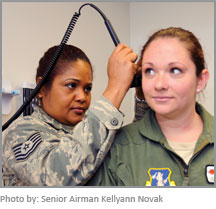Three things you may not know about your Veteran patients…
Are Veteran patients really different
from other patients?
Every patient has a unique story and veterans are certainly no different. However, a veteran’s experience with hearing loss may be a bit more colorful and complicated than that of your typical patient. For many who have worn our nation’s uniform (particularly those who have served in combat), hearing loss is very often intertwined with other resulting comorbidities.
Here are three things you may want to consider when working with veteran patients:
1. Veterans may be hesitant to listen to your advice

From the time they first enlist and endure the rigors of boot camp, military members are taught to trust in the men and women who stand beside them. Starting with those initial moments and building every day they serve, an unbreakable camaraderie is formed and a tight-knit community of trust and credibility grows. In short – veterans will most likely listen to one another before listening to anyone else.
Don’t take it personally… this doesn’t mean they won’t acknowledge your credentials or your expertise. It just means the concept of trust can be especially complex for a military member. The phrase “I’ve got your back” has a very special meaning. As such, veterans may have an especially difficult time initially following the advice of those who have not walked in their boots.
Fortunately, all it takes is a little bit of bonding. Don’t be afraid to ask about their service and let them tell you their story. Not only will this quickly build rapport, but you may also learn some valuable information about your veteran patient that can help you treat them more effectively.
2. Veterans are more likely to have two or more chronic conditions
Veterans often have a certain humbleness about them and may not be quick to open up about their service experience to healthcare providers. As a result, they have a tendency to hold back valuable information that could affect their care. While tinnitus and hearing loss continue to remain the top two service connected disabilities (according to the VA), nearly 60 percent of disabled veterans with higher disability ratings have more than one disability1 and the average number of different service connected disabilities reported by Gulf War era veterans is six2. Simply put, there’s usually a lot more going on with your veteran patients than meets the eye – or ear, as the case may be.

Conditions such as Traumatic Brain Injury (TBI) and Post Traumatic Stress Disorder (PTSD) are at the forefront of these comorbidities3, neither of which are topics that your veteran patient will easily share. However, to effectively treat veterans holistically, other comorbidities must be acknowledged. That means a few more questions and a little extra patience may be in order.
3. Veterans are taught to believe they are indestructible
In order to be effective in the most challenging of conditions, military members are taught and trained that they are the most capable of our population. Warfighters don’t complain, instead they, “bite the bullet,” which means they will often ignore illnesses or other health conditions. If they’re already in your office seeking treatment for hearing loss – that’s a great start. However, this doesn’t mean they’ll always admit when something is “wrong” with them.

The reality is that many veterans resist admitting any war-related illnesses because of the possible consequences (either real or perceived) it may bring4. Whether it’s because they are concerned about tarnishing the image of their “invincibility” or they’re not aware they’re acting any differently – veteran patients are often more likely to “suck it up” than seek assistance. Cracking through that veneer and helping veterans understand that receiving treatment is not a weakness is the key to providing holistic care and a better life for our veterans and their families.
- Hoder, Kelly Ann. “The Disability of Veterans” U.S. Census Bureau, Washington, DC. 2014
- U.S. Dept of Veterans Affairs. “FY15 Annual Benefits Report.” May 2016
- Swan, A.A., et al., Prevalence of hearing loss and tinnitus in Iraq and Afghanistan Veterans: A Chronic Effects of Neurotrauma Consortium study, Hearing Research 2017
- Veterans’ Families United Foundation. “Consequences Facing War Related Illness” http://veteransfamiliesunited.org Jun 2011
Last updated September 12, 2019
 Heroes With Hearing Loss
Heroes With Hearing Loss